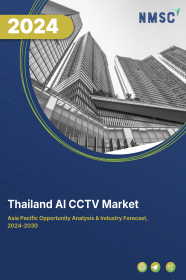
Thailand AI CCTV Market by Component (Hardware, and Software), by Camera Type (Dome Cameras, Bullet Cameras, and Box Cameras), by Technology (Facial Detection and Recognition, Emotion Recognition, Object Detection and Recognition, and Other Technologies), by Deployment (Cloud-Based, and On-Premise), and End User (Commercial, Residential, and Industrial) – Opportunity Analysis and Industry Forecast, 2024–2030
Industry: ICT & Media | Publish Date: 22-Jul-2025 | No of Pages: 143 | No. of Tables: 138 | No. of Figures: 83 | Format: PDF | Report Code : IC1989
Market Overview
Thailand AI CCTV Market size was valued at USD 342.1 million in 2023 and is predicted to reach USD 1381.1 million by 2030, with a CAGR of 20.2% from 2024 to 2030.
The AI CCTV market constitutes a segment within the global security and surveillance industry, concentrating on incorporating artificial intelligence (AI) technologies into Closed-Circuit Television (CCTV) systems. These AI-driven CCTV systems utilize sophisticated algorithms and computer vision to augment video analysis capabilities, facilitating real-time detection, identification, and response to diverse events and anomalies.
Beyond conventional surveillance, these systems introduce intelligent features such as facial recognition, object tracking, and behavior analysis. The growth of the AI CCTV market is substantial, fueled by heightened demand for advanced security solutions in commercial, industrial, and public settings. The market encompasses a variety of products and services, including AI-powered cameras, video analytics software, and integrated security systems.
Government Initiatives Accelerating AI CCTV Adoption in Thailand
Thailand is witnessing a transformative shift in its urban infrastructure, largely driven by the government’s emphasis on integrating artificial intelligence into public systems. A central aspect of this transformation is the deployment of AI-powered CCTV systems, which are becoming increasingly essential in enhancing public safety, traffic management, and city surveillance.
In a major step towards smart city development, the Thai government introduced the “Ratchaprasong Model” in early 2024—an AI-based traffic monitoring initiative aimed at reducing congestion in one of Bangkok’s busiest districts. By utilizing intelligent CCTV systems capable of analyzing traffic patterns in real time, the initiative is helping reduce delays, detect incidents quickly, and improve overall traffic flow. Such efforts demonstrate the government’s commitment to building data-driven cities, where AI surveillance is key to achieving operational efficiency and safety.
Public-Private Collaboration Catalyzing Technological Advancements
Thailand’s AI CCTV market is rapidly advancing through strong public-private collaborations that are accelerating the adoption of smart surveillance technologies. Notably, the Thai government has partnered with tech firms to implement AI-powered systems for traffic management, tourism safety, and public event monitoring. In Bangkok, AI traffic control systems have improved congestion at key intersections, while tourism hubs now feature facial recognition-enabled CCTV to enhance visitor security. Additionally, AI-powered police robots were recently deployed during major festivals to assist with crowd monitoring. These initiatives reflect Thailand’s growing commitment to integrating intelligent surveillance within its Smart City and public safety frameworks.
Rising Cybersecurity Concerns Undermine Market Confidence in Thailand's AI CCTV Landscape
In Thailand, the rapid deployment of AI-powered CCTV systems across urban infrastructure, transportation hubs, and smart city projects has raised critical concerns around cybersecurity. As these systems become more integrated with national and municipal networks, the risk of cyber intrusions—ranging from unauthorized remote access to manipulation of live feeds—has become a pressing issue.
Thai authorities and enterprises are increasingly cautious about the potential exploitation of surveillance systems for malicious purposes, such as data leaks or system shutdowns. With AI enabling real-time facial recognition, behavioural analysis, and predictive threat detection, any breach could expose sensitive personal data and national security protocols. This apprehension has led to heightened scrutiny of software origin, system architecture, and vendor transparency.
Moreover, the lack of standardized cybersecurity protocols and skilled cybersecurity professionals in the Thai surveillance sector further amplifies the risks. As a result, procurement decisions are often delayed, and some public sector entities remain hesitant to fully transition to AI-driven systems without robust cybersecurity assurances. Addressing these concerns through localized regulations and security-first product design is essential for market growth and sustained adoption.
Integration of Behavior Analytics into AI-powered CCTV Systems Unlocks Strategic Growth in Thailand
In Thailand’s rapidly modernizing security landscape, the integration of behaviour analytics into AI-enabled CCTV systems is opening new frontiers for advanced surveillance solutions. With rising urbanization and the government's increasing focus on smart city development, the demand for intelligent monitoring systems is accelerating.
AI-powered behaviour analysis allows CCTV systems to interpret human actions in real time, enabling proactive responses to unusual or potentially harmful behaviour—such as unauthorized access, erratic movement, or crowd disruptions. This evolution from passive recording to intelligent incident detection empowers both public agencies and private sector entities across Thailand to pre-empt security breaches more effectively.
From transportation hubs and educational institutions to commercial zones and public infrastructure, the adoption of AI CCTV with behaviour analytics is transforming traditional security protocols. This shift not only enhances situational awareness but also streamlines decision-making and reduces response times during critical events—making it a key technological enabler in Thailand's ongoing efforts to strengthen national security and public safety infrastructure.
Competitive Landscape
Thailand AI CCTV market comprises various market players, such as Hangzhou Hikvision Digital Technology Co., Ltd., Zhejiang Dahua Technology Co., Ltd., Axis Communications AB, Motorola Solutions, Inc., Hanwha Vision Co., Ltd., Tiandy Technologies, IDIS Ltd, Arlo Technologies, Inc., Vivotek Inc., Bosch Security Systems, Zhejiang Uniview Technologies Co., Ltd., Panasonic Holdings Corporation, Honeywell Security Group, D-Link Corporation, Teledyne FLIR, and others. These market players are adopting various strategies such as collaboration and product launches across various regions to maintain their dominance in the AI CCTV market.
Thailand AI CCTV Market Key Market Segments
By Component
-
Hardware
-
Cameras
-
Storage Devices
-
Others
-
-
Software
-
Video Analytics Software
-
Video Management Software
-
By Camera Type
-
Dome Cameras
-
Bullet Cameras
-
Box Cameras
By Technology
-
Facial Detection and Recognition
-
Emotion Recognition
-
Object Detection and Recognition
-
Other Technologies
By Deployment
-
Cloud-Based
-
On-Premise
By End User
-
Commercial
-
Residential
-
Industrial
Key Players
-
Hangzhou Hikvision Digital Technology Co., Ltd.
-
Zhejiang Dahua Technology Co., Ltd.
-
Axis Communications AB
-
Motorola Solutions, Inc.
-
Hanwha Vision Co., Ltd.
-
Tiandy Technologies
-
IDIS Ltd
-
Arlo Technologies, Inc.
-
Vivotek Inc.
-
Bosch Security Systems
-
Zhejiang Uniview Technologies Co., Ltd.
-
Panasonic Holdings Corporation
-
Honeywell Security Group
-
D-Link Corporation
-
Teledyne FLIR
REPORT SCOPE AND SEGMENTATION:
|
Parameters |
Details |
|
Market Size in 2023 |
USD 342.1 Million |
|
Revenue Forecast in 2030 |
USD 1381.1 Million |
|
Growth Rate |
CAGR of 20.2% from 2024 to 2030 |
|
Analysis Period |
2023–2030 |
|
Base Year Considered |
2023 |
|
Forecast Period |
2024–2030 |
|
Market Size Estimation |
Million (USD) |
|
Growth Factors |
|
|
Companies Profiled |
15 |
|
Market Share |
Available for 10 companies |
|
Customization Scope |
Free customization (equivalent up to 80 working hours of analysts) after purchase. Addition or alteration to country, regional, and segment scope. |
|
Pricing and Purchase Options |
Avail customized purchase options to meet your exact research needs. |




















 Speak to Our Analyst
Speak to Our Analyst

























